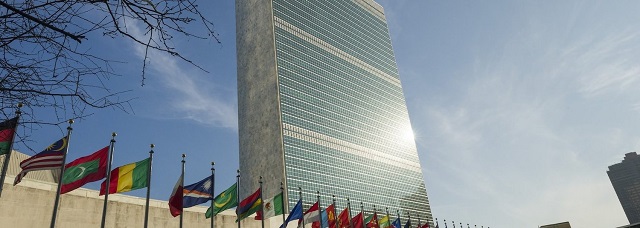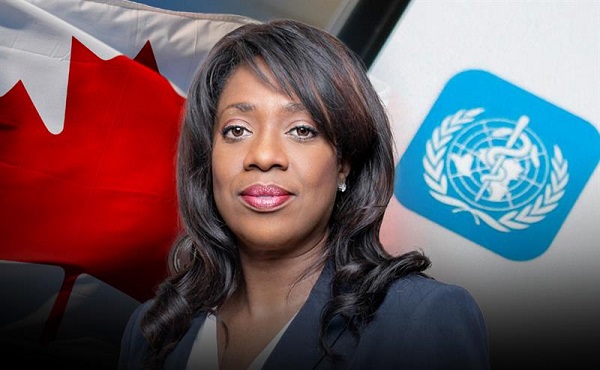International
Can We Finally Talk About United Nations Funding?


David Clinton 
Billions of dollars disappear into the black hole. Not much value comes out the other end
No area touched by government policy should be off-limits for open discussion. It’s our money, after all, and we have the right to wonder how it’s being spent. Nevertheless, there’s no shortage of topics that, well, aren’t appreciated in more polite company. Until quite recently, I somehow assumed that Canada’s commitments to the United Nations and its many humanitarian programs were among those restricted topics. I had my own deep reservations, but I generally kept my thoughts to myself.
Then the Free Press published a debate over US funding for the UN. I know that many subscribers of The Audit also read the Free Press, so this probably isn’t news to most of you. If questioning UN funding was ever off limits, it’s officially open season now.
The Audit is a reader-supported publication. To receive new posts and support my work, consider becoming a free or paid subscriber.
The only defense of the organization to emerge from the debate was that America’s spooks need the surveillance access made possible by the UN headquarter’s New York address, and the city needs the billions of dollars gained from hosting the big party. No one, in other words, could come up with a single friendly word of actual support.
For context, Canada doesn’t bill for parking spots around Turtle Bay in Manhattan. And our spies are not up to the task of bugging hospitality suites anywhere nearby.
How much money do Canadian taxpayers spend on the United Nations? According to data from Canada’s Open Government resource, UN-targeted grants cost us at least $3.7 billion between 2019 and 2022. That number could actually be a lot higher since it’s not always easy to identify spending items as specifically UN-related.
Of that $3.7 billion, more than $265 million went to administrative and headquarters operations. Those administrative grants included $209 million directed to the “United Nations Organization” and officially described as “Canada’s assessed contribution to the United Nations Regular Budget”. Membership dues, in other words.
So what do we get for those dues? Arguably, nothing at all. Because the actual work of the UN happens through their specific programs – which were covered by the other $3.5 billion we contributed.
Unfortunately, those contributions are often misspent. Take as an example the eight million or so dollars Canada sends each year to the United Nations Interim Force in Lebanon (UNIFIL). Since 1978, UNIFIL’s 10,000-strong contingent’s only job has been to:
“confirm Hezbollah demilitarization, support Lebanese army operations against insurgents and weapon smuggling, and confirm Israeli withdrawal from Lebanon, in order to ensure that the government of Lebanon would restore its effective authority in the area”.
It’s no secret how splendidly that worked out. Hezbollah cheerfully spent the best part of the past two decades building some of the most robust military infrastructure on earth. And all under the direct supervision of UNIFIL.
Then there’s the disturbing relationship between United Nations Relief and Works Agency for Palestine Refugees in the Near East (UNRWA) and both Hamas and Hezbollah. As I’ve already written, by their own admission, Global Affairs Canada completely missed (or chose to ignore) that one. UNRWA cost Canadians $55 million between 2019 and 2022.
It’s true that some UN peacekeeping missions from decades back saw success, like operations in Namibia, Mozambique, Sierra Leone, East Timor, and El Salvador. But the failures were, to say the least, noticeable. Those included Rwanda, Bosnia and Herzegovina, Somalia, Angola, Haiti, and Darfur. And all that’s besides the accusations of widespread, systemic sexual abuse committed by peacekeepers just about anywhere they go. The peacekeeping model’s value proposition is far from proven, but the financial costs are right out there in the open.
Besides their regular happens-to-the-best-of-us failures, the UN has carefully cultivated their own unique brand of corruption. In 2005, Paul Volcker’s Independent Inquiry Committee (IIC), for example, reported on widespread corruption and abuse associated with the UN’s Oil-for-Food program for Iraqi citizens.
The United Nations Educational, Scientific and Cultural Organization (UNESCO) has long been associated with corruption, cronyism, and a general lack of financial control. But to be fair, those claims are very much in line with accusations regularly leveled against the UN as a whole.
Most Canadians are agreeable to sharing their collective wealth and expertise with those around the world who are less fortunate. But we’d be far more effective at it by creating our own programs and bypassing the rotting corpse of the United Nations altogether. That is, after all, what Global Affairs Canada is supposed to be doing.
While I’ve still got your attention, there’s one other United Nations-y thing that I’d like to discuss. While researching this post, I accessed official data representing all UN Security Council and General Assembly resolutions since 2000. Fascinating stuff, I assure you. But it didn’t turn out the way I’d expected.
You see, for years I’ve been hearing about how UN resolutions are overwhelmingly focused on condemnations of Israel – to the point where Israel takes up the majority of the organization’s time.
In fact, there were far too many spurious and gratuitously hostile anti-Israel resolutions. And I defer to no one in my contempt for each one’s dishonesty and hypocrisy. But unless there’s something very wrong with the official UN data on resolutions, condemnations of Israel take up no more than a small minority of their time.
Specifically, of the 1,594 General Assembly resolutions from the past quarter century, just 60 or so targeted Israel. And the Security Council faced a total of 1,466 resolutions over that time, of which only somewhere in the neighborhood of 55 concerned everyone’s favorite colonial-settler, apartheid, space laser-firing, and weather-controlling oppressor.
The cesspool that is the modern UN is bad enough on its own merits. There’s no need to manufacture fake accusations.
International
Trump and Xi meet in South Korea, signal thaw after year of tariff wars

President Trump and Chinese President Xi Jinping met Thursday in South Korea for their first summit since Trump’s return to the White House, striking a tone of cautious optimism as they sought to cool trade tensions that have strained relations between the world’s two largest economies. Meeting at a South Korean air base, the two leaders exchanged warm greetings and spoke positively about finding common ground after a year of tariff battles. “Great pleasure to see you again,” Xi told Trump as cameras flashed. Trump responded that he expected a “very successful meeting” and predicted a “great understanding” between the two sides.
.@POTUS meets with Chinese President Xi Jinping for the first time since 2019: "It's a great honor… I think we're going to have a fantastic relationship for a long period of time — and it's an honor to have you with us." pic.twitter.com/ueW2gvMcCy
— Rapid Response 47 (@RapidResponse47) October 30, 2025
Xi, speaking through an interpreter, praised Trump’s leadership and said China’s progress “goes hand in hand with your vision to make America great again.” He emphasized that both nations could “help each other succeed and prosper together,” framing the talks as a step toward renewed partnership rather than rivalry. The meeting followed weeks of negotiations between U.S. and Chinese trade officials, who had reached a “basic consensus” on key issues in advance. Xi noted that the talks yielded “encouraging progress” on “major concerns” for both nations and even commended Trump’s role in mediating other global disputes, including conflicts in the Middle East and Southeast Asia.
According to U.S. officials, Trump’s team has signaled readiness to scale back select trade duties if Beijing meets enforcement commitments. The president is expected to ease some of those measures in exchange for China’s one-year suspension of export restrictions on rare-earth and critical minerals — materials vital to American manufacturing. In return, Beijing will reportedly intensify efforts to curb fentanyl smuggling, which U.S. data shows has contributed to roughly one in every 1,000 American deaths over the past five years. China is also preparing to resume large-scale soybean purchases, reversing retaliatory tariffs that hit U.S. farmers earlier this year.
While Trump acknowledged Xi as a “tough negotiator,” he told reporters he had “no doubt” the summit would deliver results. The meeting — framed around mutual economic relief and renewed cooperation — marked a rare bright spot in a relationship defined by tariffs, tech restrictions, and strategic competition. Whether the goodwill in Seoul translates into lasting policy changes remains to be seen, but Thursday’s encounter suggested both leaders are eager to ease tensions and show progress after a bruising trade standoff.
Health
Leslyn Lewis urges Canadians to fight WHO pandemic treaty before it’s legally binding

From LifeSiteNews
Conservative MP Leslyn Lewis is urging Canadians to demand a parliamentary debate on the WHO Pandemic Agreement, highlighting risks to national sovereignty.
Conservative Member of Parliament (MP) Leslyn Lewis called on Canadians to petition against the World Health Organization’s (WHO) pandemic treaty before it becomes legally binding.
In an October 23 post on X, Lewis encouraged Canadians to demand that politicians debate the WHO Pandemic Agreement before it becomes law after warnings that the treaty could undermine national freedom and lead to global surveillance.
“I have raised red flags about its implications on Canada’s health sovereignty and the federal government’s willingness to enter a legally binding treaty of this weight without any input from Parliament,” she declared.
In May, Canada, under Liberal Prime Minister Mark Carney, adopted the treaty despite warnings that the agreement gives the globalist entity increased power in the event of another “pandemic.”
However, Lewis revealed that since the agreement has yet to be officially signed, Canada is not bound to it and can still make amendments.
“We are now in a critical window of opportunity to ask tough questions and debate the treaty before it is signed by the Minister of Foreign Affairs and binds our nation,” she explained.
Lewis encouraged Canadians to sign a petition calling for a debate of the agreement as well as contacting their local MPs to request a parliamentary review of the treaty.
Lewis revealed that Canadians’ persistent opposition to the treaty has already resulted in some of the more dangerous clauses, including restricting free speech, freedom of movement, and government surveillance, being removed from the final agreement.
“Thanks to the engagement of countless Canadians and concerned citizens around the world, the most extreme provisions in the WHO Pandemic Treaty were removed — these measures would have undermined national healthcare sovereignty and given international bureaucrats sweeping powers,” Lewis declared.
“The removal of provisions on vaccine mandates, misinformation and disinformation, censorship requirements, travel restrictions, global surveillance, and mandatory health measures happened because people paid attention and spoke up,” she continued.
Among the most criticized parts of the agreement is the affirmation that “the World Health Organization is the directing and coordinating authority on international health work, including on pandemic prevention, preparedness and response.”
While the agreement claims to uphold “the principle of the sovereignty of States in addressing public health matters,” it also calls for a globally unified response in the event of a pandemic, stating plainly that “(t)he Parties shall promote a One Health approach for pandemic prevention, preparedness and response.”
-

 Business1 day ago
Business1 day agoCanada heading into economic turbulence: The USMCA is finished and Canadian elbows may have started the real fight
-

 Internet1 day ago
Internet1 day agoMusk launches Grokipedia to break Wikipedia’s information monopoly
-

 Business2 days ago
Business2 days agoCanada has given $109 million to Communist China for ‘sustainable development’ since 2015
-

 Business1 day ago
Business1 day agoBill Gates walks away from the climate cult
-

 MAiD2 days ago
MAiD2 days agoStudy promotes liver transplants from Canadian euthanasia victims
-

 Opinion2 days ago
Opinion2 days agoBritish Columbians protest Trump while Eby brings their province to its knees
-

 Business1 day ago
Business1 day agoFord’s Liquor War Trades Economic Freedom For Political Theatre
-

 International2 days ago
International2 days agoStrongest hurricane in 174 years makes landfall in Jamaica








